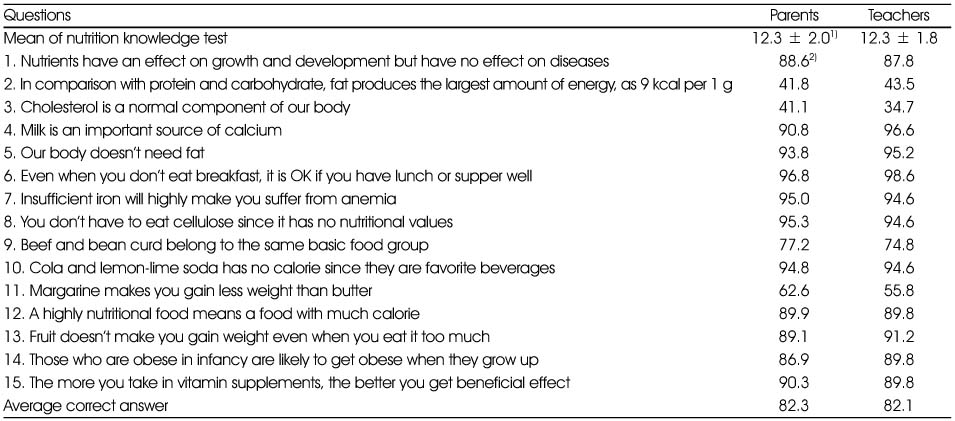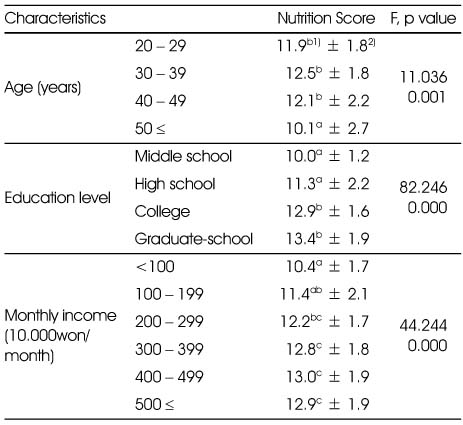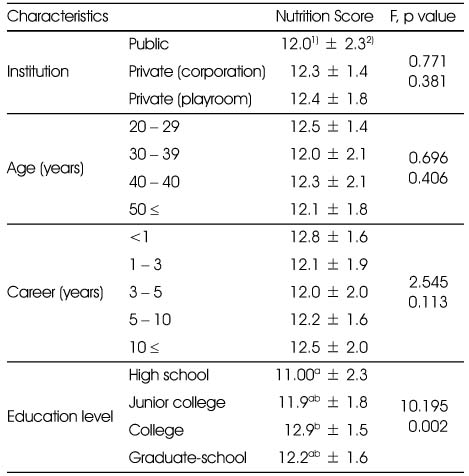Articles
- Page Path
- HOME > Korean J Community Nutr > Volume 16(6); 2011 > Article
-
Original Article
- The Difference of Perception about Nutritional Problems and Food intakes, Nutrition Knowledge Score and Realities of Nutrition Education between Parents and Preschool Teachers
- Joo Hee Lee, Eun Jung Kang, Changim Kim
-
Korean Journal of Community Nutrition 2011;16(6):636-646.
DOI: https://doi.org/10.5720/kjcn.2011.16.6.636
Published online: December 31, 2011
Department of Food & Nutrition, Gyeongsang National University, Jinju, Korea.
1Nutrition Education Major, Graduate School of Education, Gyeongsang National Unversity, Jinju, Korea.
2Department of Food & Nutrition, Hyechun College, Seo-Gu, Daejon, Korea.
- Corresponding author: Joo Hee Lee, Department of food and nutrition, Gyeongsang National University, 501 Jinju-Daero, Jinju-city, GyeongNam 660-701, Korea. Tel: (055) 772-1433, Fax: (055) 772-1439, joohlee@gnu.ac.kr
Copyright © 2011 The Korean Society of Community Nutrition
- 1,260 Views
- 2 Download
- 11 Crossref
Abstract
- This study was conducted to investigate the difference of perception about nutritional problems and food intakes and nutrition knowledge score and realities of nutrition education between parents and preschool teachers. This research can be summarized as follows: there was the statistical difference of perception (χ2 = 52.451, p = 0.000) about nutritional problem of preschoolers between parents and preschool teachers. Parents (56.4%) and teachers (58.5%) identified eating only what they want as the most common nutritional problem of children, but they had different perception about the other problems. To parents, "No nutritional problem" (16.3%) is the second and "Overindulgence of processed food" (11.1%) is the third problem of preschoolers. To teachers, "Overindulgence of processed food" (23.8%) is the second and "Obesity" (14.3%) is the third problem. The perception on food intakes of preschoolers was statistically different in meats (χ2 = 8.892, p = 0.030), fish (χ2 = 32.241, p = 0.000), beans (χ2 = 14.770, p = 0.005), vegetables (χ2 = 12.706, p = 0.013), fruits (χ2 = 14.438, p = 0.006) and milk & dairy products (χ2 = 28.591, p = 0.000) between parents and preschool teachers. However, nutritional knowledge was not different between parents and preschool teachers. While 96.6% of preschool teachers felt that it was necessary to educate preschoolers, only 41.5% of them said that they fulfilled nutrition education, showing that nutrition education was not adequately carried out on the spot. Therefore providing basic materials through which nutritional management guidance and proper nutrition education for preschoolers can be carried out by investigating and analyzing knowledge on their nutrition and meal guidance activities for preschooler teachers and parents.
- 1. Choi MJ, Jung YS. The status of eating habits and nutrient intakes of preschool children in Kyungjoo. Korean J Community Nutr. 2006; 11(1): 3-13.
- 2. Chung SJ, Lee YN, Kwon SJ. Factors associated with breakfast skipping in elementary school children in Korea. Korean J Community Nutr. 2004; 9(1): 3-11.
- 3. Her ES, Jung SH. Analysis of dietary education status and the demand of child center teachers in Masan. Korean J Food Nutr. 2009; 22(2): 166-176.
- 4. Hong SM, Seo YE, Kim HJ. A study on nutritional status of preschool children in Ulsan area-I. Food habit and eating behavior. J Human Ecol(University of Ulsan). 2001; 3(1): 77-92.
- 5. Hong YJ. A study on a relation of food ecology to obesity index of 5th grade children in Cheju city (2). Korean J Food Cult. 1998; 13(2): 141-151.
- 6. Hong YJ. Relationship between maternal body image, weight and preschool children's food choice and nutrient intake. 2009; Jungbu University; MS thesis.
- 7. Hwang YJ. Nutritional assessment including dietary, anthropometric, and hematological analysis according to age and Kaup Index of preschool children. 2006; Myongji University; MS thesis.
- 8. Idler EL, Angel RJ. Self-rated health and mortality in the NHANES-1 epidemiological follow-up study. Am J Public Health. 1990; 80(4): 446-452.ArticlePubMedPMC
- 9. Jung KB. A study on kindergarten teachers' perception and status of nutrition education. 2007; Korea National Open University; MS thesis.
- 10. Kang KJ. A study on food habits, nutrient intakes and nutritional quality of preschool children in Seoul. Korean J Community Nutr. 2005; 10(4): 471-483.
- 11. Kang SH. Analysis of nutritional status and nutritional management of the infants in Jeju public nursery. 2008; Korea National Open University; MS thesis.
- 12. Kim HM. A comparison of kindergarten teachers' and parent's recognition of the early childhood eating habits guidance. 2009; Gangneung-Wonju National University; MS thesis.
- 13. Koblinsky SA, Guthrie JF, Lynch L. Evaluation of a nutrition education program for head start parents. J Nutr Educ. 1992; 24(1): 4-13.Article
- 14. Ku UH, Seo JS. The status of nutrient intake and factors related to dislike of vegetables in elementary school students. Korean J Community Nutr. 2005; 10(2): 151-162.
- 15. Lee IY, Lee IH. Prevalence of obesity among adolescent girls in Seoul and its relationship to dietary intakes and environmental factors. Korean J Nutr. 1986; 19(1): 41-51.
- 16. Lee JH, Kim CI. Effect of mothers' weaning attitudes on their children's food habits and development. Korean J Community Nutr. 2006; 11(5): 551-561.
- 17. Lee KW, Nam HW, Myung CO, Park YS. Nutrition knowledge and guidance activities during meal time of day care center teachers. J East Asian Soc Diet Life. 2005; 15(5): 623-631.
- 18. Lee NH, Joung HJ, Cho SH, Choi YS. A study on the development of programs for the nutrition education of preschool nursery facilities. Korean J Community Nutr. 2001; 6(2): 234-242.
- 19. Lee SH, Lee MH, Ohm JA, Kim JH. Management of food and nutrition service in early childhood care center. Korea Assoc Child Educ. 2001; 24(3): 83-103.
- 20. Lee YM, Oh YJ. A study on kindergarten's meal service program and children's food intake. Korean J Nutr. 2005; 38(3): 232-241.
- 21. Lim HJ. A study on the food habit and the evaluation of nutrient intake of preschool children in Pusan. J Korean Soc Food Sci Nutr. 1999; 28(6): 1369-1379.
- 22. Lim JH. (A) Study on the dietary life of full-day, Half-day program children and their mother of kindergarten in Daejeon. 2004; Jungbu University; MS thesis.
- 23. Min IJ. (A) study on dietary life habits, food preference of the infants, and knowledges and attitudes of teachers and parents about nutrition, and growth and problem behavior of the infants. 2009; Kyung Hee University; MS thesis.
- 24. Noh EH, Kim JS. The integrated cooking program development for an unbalanced diet intervention of young children. Korean J Child Educ Care. 2007; 7(1): 81-93.
- 25. Ohm JA, Lee SH. A study of the relationship between early childhood teachers' attitudes toward early childhood nutrition and their knowledge of nutrition. Korean J Early Child Educ. 2004; 24(3): 5-21.
- 26. Park KM. A survey of teacher's recognition on nutrition knowledge and nutrition education at day care centers. Korean J Community Nutr. 2005; 10(6): 920-929.
- 27. Park MY, Um JS, Hyun HJ, Park HR, Chung YJ. Comparison of indices for diet quality evaluation of Korean adolescents by residence area and boy size. Korean J Community Nutr. 2006; 11(2): 180-190.
- 28. Sin EK, Lee YK. Menu development and evaluation though eating behavior and food preference of preschool children in daycare centers. Korean J Food Cult. 2005; 20(1): 1-14.
- 29. Song BG. (A) study on the effect of home education programs for correcting unbalanced vegetable diet. 2010; Graduate School of Traditional Culture and Arts Sookmyung Women's University; MS thesis.
- 30. Song J, Heo YR. A study on nursery school teacher's knowledge and education of nutrition care in Gwang-Ju. Korean J Community Nutr. 2010; 15(2): 159-168.
- 31. The national survey of daycare. Statistics Korea. 2010; Available from http://www.kosis.kr/.
REFERENCES


Figure & Data
REFERENCES
Citations

- Dietary Behavior and Related Factors of Preschool Children in Seocheon-gun, Korea
Seung-Lim Lee, Sun-Im Won
Journal of the East Asian Society of Dietary Life.2022; 32(1): 34. CrossRef - Analysis of the types of eating behavior affecting the nutrition of preschool children: using the Dietary Behavior Test (DBT) and the Nutrition Quotient (NQ)
Hyeon Mi Sim, Youngshin Han, Kyung A Lee
Journal of Nutrition and Health.2019; 52(6): 604. CrossRef - Study on Recognition and Consumption Behavior of Quality-Certified Children's Preferred Foods of Nursery Directors and Parents in Jecheon Area
Sung Hee Min
Korean Journal of Food & Cookery Science.2017; 33(3): 353. CrossRef - Nutritional status of 3~5 year old children attending kindergarten and childcare facilities: Using data from the 2010 and 2014 Korea National Health and Nutrition Examination Surveys
Mi Yeon Park, Pil Sook Park
Journal of Nutrition and Health.2017; 50(4): 361. CrossRef - The awareness level and needs for education on reducing sugar consumption among mothers with preschool children
Younhee Lee, Nami Joo
Nutrition Research and Practice.2016; 10(2): 229. CrossRef - Evaluation of Nutrition Quotient and Related Factors in Preschool Children
Yeon Hyang Jung, Jung Hee Kim
Korean Journal of Community Nutrition.2016; 21(1): 1. CrossRef - Study on Development and Evaluation of Nutritional Education Program for Preschool Children in Association with Center for Children's Foodservice Management, Childcare Facilities and Home
Chae-Young Jo, Ji-Hyeon Kim, Jin-Suk Han
Journal of the East Asian Society of Dietary Life.2015; 25(2): 372. CrossRef - A Study on Differences of Nutritional Knowledge·Food Hygiene and Practice between Foodservice Employees and the Housewives
Joo Hee Lee, Ji Yeon Shin, Changim Kim
The Korean Journal of Food And Nutrition.2014; 27(6): 1022. CrossRef - Evaluation of Food Behavior and Nutritional Status of Preschool Children in Nowon-gu of Seoul by Using Nutrition Quotient (NQ)
Jung Hee Kim, Yeon Hyang Jung
Korean Journal of Community Nutrition.2014; 19(1): 1. CrossRef - A Study on the Actual State of Nutrition Knowledge, Dietary Attitude, Eating Behavior, Physical Ability and Locomotion of Children Aged 5 Years in Siheung-city
Se-Hee Pyo, Hyun-Joo Kang
The Korean Journal of Food And Nutrition.2014; 27(5): 760. CrossRef - Measuring Differences in Food Iintakes and Dietary Habits of Preschool Children by the Weight-Length Index
Joo Hee Lee, Eun Jung Kang, Changim Kim
Journal of the Korean Dietetic Association.2013; 19(1): 34. CrossRef
General characteristics of parents and preschool teachers
1) N (%)
Work characteristics of preschool teachers
1) N (%)
Food habits of children by parents
1) N (%)
The difference of perception about nutrition problem of children between parents and preschool teachers
The difference of perception about food intakes of children between parents and preschool teachers
1) N (%)
Percentage of correct answers in nutrition knowledge test
1) Mean ± SD, 2) percent
Nutrition knowledge score by general characteristics of parents
1) a, b, c are significantly different by turkey's multiple range test
2) Mean ± SD
Nutrition knowledge score by general characteristics of preschool teachers
1) a, b, c are significantly different by Turkey's multiple range test
2) Mean ± SD
Realities of nutrition education by parents
1) N (%)
Realities of nutrition education by preschool teachers
1) N (%)
1) N (%)
1) N (%)
1) N (%)
1) N (%)
1) Mean ± SD, 2) percent
1) a, b, c are significantly different by turkey's multiple range test 2) Mean ± SD
1) a, b, c are significantly different by Turkey's multiple range test 2) Mean ± SD
1) N (%)
1) N (%)

 KSCN
KSCN








 Cite
Cite


